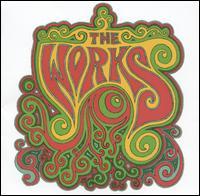The Works have plenty in common with label-mates Dungen, both of whom play a reworked form of psychedelia with such broad strokes their music feels best suited for another time. This, of course, can be seen as a source of a whole host of issues for anyone who consistently listens to the originals, but in another way the time warp is almost welcome. They offer slightly different outlooks on the influences from which they draw, but both bands periodically fail to offer some of the accessible features that pscyh acts once could.
Even with all the baggage, the recreation is quite impressive, often imparting the necessary aloofness without succumbing to hastily constructed or obvious subjects (although the clear drug references that dominant "Speak Your Mind" may be an exception). If anything, one can appreciate the gusto with which the songs are arranged. Little is spared, and most songs see countless layered instruments with at least one under some sort of thick haze, from wailing guitars to organ heroics and, of course, some time for some light flute and harmonica accompaniment. The first song, "Everybody" makes the clear statement, spiraling around an infectious guitar and harmonica backbone and building into an appropriate climax of screeching guitars, overactive drumming and vocals struggling simply to be heard over the ruckus. "Time to Wake Up" shows the softer side, working as a continuous crescendo and showcasing Andreas Stellan's singing. It is still a sound from a bygone era, however, which may be the biggest hindrance to its complete effectiveness: Although it stays true to its roots, it can never completely escape or change them and is therefore not as compelling. Though this may detract from the overall immediacy, the songs still convey their brimming excitement toward something new -- anything new; it's just an old face saying it.
The album uses some contrasting elements, especially the quiet "Numb and Blind" on which guitarist Martin Fogelström finally hands over his reins for a few minutes to a distant and distorted Stellan. A little more discretion in creating these contrasting moments could have gone a long way in accentuating some of the more spastic moments, but the Works seem content on constantly pushing the music. The mixture of acoustic and flute backing on "Slow as She Goes" works well but could have been showcased even more throughout the lengthy song. "The Tale" shows some of the best discretion, combining all the pieces into a whole that never careens out of control.
For bands such as the Works and Dungen, there is inevitably less mystique around what they are attempting and how they do so compared to their long-departed kin, but the competence they show, and perhaps even the unwillingness to acknowledge it is such a different time, end up propelling the whole into a satisfying trip to a time when things were much simpler. And even though it's nowhere new, it's still a nice view.
